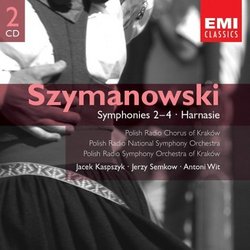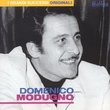| All Artists: Wieslaw Ochman Title: Szymanowski: Symphonies #2-4, Harnasie, 2 Mazurkas, Concert Overture in E Members Wishing: 0 Total Copies: 0 Label: EMI Classics Release Date: 6/1/2004 Album Type: Original recording remastered Genre: Classical Styles: Ballets & Dances, Ballets, Forms & Genres, Concertos, Theatrical, Incidental & Program Music, Historical Periods, Modern, 20th, & 21st Century, Instruments, Keyboard, Symphonies Number of Discs: 2 SwapaCD Credits: 2 UPC: 724358553925 |
Search - Wieslaw Ochman :: Szymanowski: Symphonies #2-4, Harnasie, 2 Mazurkas, Concert Overture in E
 | Wieslaw Ochman Szymanowski: Symphonies #2-4, Harnasie, 2 Mazurkas, Concert Overture in E Genre: Classical
|
Larger Image |
CD DetailsSimilar CDs
|
CD ReviewsA Szymanowski Primer Micromegas | Ada, OK | 04/12/2008 (5 out of 5 stars) "These discs feature powerful, shimmering, and at times folkloric works that span the gamut of Szymanowski's career. As a two-disc set this is a mega bargain, as you get symphonies 2-4, the ballet Harnasie, the Concert Overture, and some piano pieces thrown in for good measure. The playing and sound are first rate, and the incredible quality of the works themselves are staggering--particularly if you know little of Szymanowski's work. In general, he follows a trajectory of Strauss, Scriabin, Stravinsky (early period), Debussy, and Bartok, yet his sound world is utterly his own, and his music has a very distinct personality. The earliest piece is the beautiful Concert Overture, sounding very much like overheated Strauss. It's very memorable and becomes only more so with repeated listens. The weakest work in the set is the expansive, Scriabinesque Second Symphony, which is in the mold of that composer's "Divine Poem" or "Poem of Ecstacy." It's a beautiful, sensuous work, showcasing his talent for shimmering, otherworldly orchestration. It feels a bit meandering, and though the work definitely grows on you, it has a sense of intoxicated aimlessness about it (not necessarily a bad thing). Symphony No.3 "Song of the Night" is a 20th century masterpiece, its dramatic atmosphere heightened by the tenor and chorus. Nothing could be further from the aural bath of the 2nd symphony; this work is concise, chilling, and follows a clear path from beginning to end. It's sound world is as unique as Janacek's Glagolitic Mass, and shares with that work some of its Slavic inspiration. Symphony No.4 is a brilliant concertante work with piano that is just short of a full-fledged piano concerto; sounding a bit like Prokofiev at times, it intermixes brooding drama with high spirits, allowing the piano to narrate the adventures. Again, concision and purpose replace Scriabinesque reverie. More similar to Bartok is the tremendous ballet Harnasie "The Highland Robbers," with its haunting choral and solo accompaniment. The work draws on folk music from the Tatra mountains, rendering it a stark, primal quality not far removed from The Rite of Spring. However, it is closer to the pure source of the folk tradition that Bartok attempted to capture in many of his works (notably Cantata Profana or The Wooden Prince). Though flitered through Szymanowski's artistic persona, this has the stamp of "authentic" music, and breathes the soul of the Tatras Mountains, at least from someone who has only visited them in his dreams. The piano works provide a nice makeweight to round off the program, with a few Mazurkas and an early Theme and Variations. I am anxious to explore these works in more depth, and I imagine their appearance here is merely to whet our appetite for these often-overlooked works in Szymanowski's output. In short, a sure-fire set of discs that paint an astonishing potrait of one of the 20th century's greatest--yet sadly overlooked--masters." Stunning David Saemann | 05/19/2009 (5 out of 5 stars) "I agree with almost everything Micromegas has to say about these works, although I think I like the Second Symphony better than he does. So I would like to say a few things about the performers. It is rare to come across a budget priced compilation that includes such idiomatic music making. Jacek Kaspszyk, Jerzy Semkow, and Antoni Wit are each among the finest Polish conductors of the last half century, and have recorded widely in the standard repertory. Kaspszyk brings off rich and robust recordings of the Concert Overture and the Second Symphony, both ripely Romantic and featuring the fine Polish National Radio Symphony, whom we have become so familiar with due to its many recordings for Naxos. Jerzy Semkow, former conductor of the St. Louis Symphony (remember his Schumann set with them?), has tremendous insight into the Third and Fourth Symphonies, both of which were recorded with the Katowice orchestra on tour at Abbey Road. I also enjoy Karol Stryja's recording of the Third. It is perhaps not as incisive as Semkow's, but it benefits from superior digital sound that really makes the work's colors more striking. Lastly, Antoni Wit, a superb conductor of Modernism from Mahler and beyond, gives Harnasie a taut and spiky reading, invoking a sound world that, like the Third Symphony, is clearly Szymanowski's own. As for the piano works, Felicja Blumenthal does her compatriot proud, especially in the early Op. 3 Variations, which feels like an excercise in Late Romanticism. More in depth traversals of the Mazurkas can be found by Marc-Andre Hamelin. This set is so good it is almost self-recommending, although the analog sound is a little trite compared with the digital offerings of Szymanowski's works. Nevertheless, this is Szymanowski to the manner born."
|

 Track Listings (6) - Disc #1
Track Listings (6) - Disc #1

